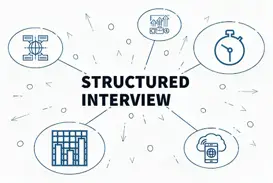How to Prepare for a Structured Interview
If you are looking for a job in the internet industry, civil service, or public institutions, you may encounter a structured interview in your hiring process. This is a common way for employers to evaluate your suitability for the position based on your communication skills and competencies.
In this blog post, We will explain what a structured interview is, why it is used, what its characteristics are, and how to prepare for it.
What is a Structured Interview?

A structured interview is a type of interview where the interviewer asks you job-related questions based on the specific requirements and competencies of the position. The questions are predetermined and standardized, and the interviewer evaluates your answers based on a set of criteria and scoring system.
For example, if you are applying for an operations position, you may be asked questions about your knowledge of the industry, your ability to analyze data, your problem-solving skills, or your teamwork spirit.
The purpose of a structured interview is to assess your logical thinking, communication ability, teamwork spirit, and problem-solving skills in a fair and objective way.
Why is a Structured Interview Used?
A structured interview is used because it has many advantages over a traditional interview.
A traditional interview is more casual and subjective. The interviewer may ask different questions to different candidates, or base their evaluation on their personal impressions or preferences.
A structured interview is more standardized and objective. The interviewer asks the same questions to all candidates applying for the same position, and uses a specific scoring system to evaluate their answers. This ensures that the evaluation is consistent and fair.
A structured interview is also more reliable and valid. It tests the candidates’ knowledge, skills, and abilities that are relevant to the job position, rather than their irrelevant or superficial characteristics. This ensures that the evaluation is accurate and predictive of their job performance.
What are the Characteristics of a Structured Interview?

A structured interview has four main characteristics:
1. The interview questions are designed based on the job analysis.
The interviewer analyzes the work content and characteristics of the specific position, and identifies the key competencies and qualities required for the job. Then, they design the interview questions based on these competencies and qualities. The questions are related to the job position and highlight the professional characteristics.
2. The interview process is standardized for all applicants.
The interviewer follows a fixed procedure for conducting the interview. They use the same guidance language, interview time, question order, and implementation conditions for all candidates. This ensures that the interview process is consistent and fair.
3. The interview evaluation has standardized and operable evaluation criteria.
The interviewer uses a specialized evaluation system to score the candidates’ answers. They have a set of criteria and indicators for each question, and assign points based on how well the candidates meet these criteria. They also eliminate the highest and lowest scores from each examiner group, and calculate an average score for each candidate. Then they synthesize a total score according to weight.
4. The composition of examiners has structure.
The interviewer forms an examiner group with at least two members. The examiner group is configured according to professional requirements, such as having different backgrounds, expertise, or perspectives. The examiner group works together to ask questions, observe candidates’ behaviors, and evaluate candidates’ answers.
How to Prepare for a Structured Interview?

To prepare for a structured interview, you need to do some research and practice before the interview day.
Company Research
First, you need to research about the company, the industry, and the position that you are applying for. You need to understand their mission, vision, values, culture, products, services, customers, competitors, trends, challenges, etc. You also need to know what are the main responsibilities, tasks, skills, and qualities of the position that you are interested in.
Practice Answering Common or Possible Questions
Secondly, you need to practice answering common or possible questions that may be asked in a structured interview. You can find relevant question banks or similar questions on online platforms or books before taking an exam. You can also ask someone to mock-interview you or record yourself answering these questions.
When answering these questions, you need to use clear and logical expressions that demonstrate your knowledge, skills, abilities, motivation, temperament etc., especially those related to responsibilities and skills of the position. You also need to use examples or evidence from your previous work or study experience to support your answers.
Watch your Attitude and Image
Thirdly, you need to pay attention to your attitude and image during the interview. You need to be calm and confident when answering questions. You need to be humble and polite when interacting with examiners or other candidates. You need to be attentive and effective when listening to feedback or instructions. You need to dress appropriately and professionally according to the company’s dress code or culture.
By following these steps, you can prepare well for a structured interview and increase your chances of getting hired.
In Summary
A structured interview is a common form of talent evaluation used by civil servants and large enterprises. It evaluates whether candidates meet the requirements of the recruitment position based on their communication skills and competencies.
To ace a structured interview, you need to know what it is, why it is used, what its characteristics are, and how to prepare for it.
Aniday's HR Services
Headhunting Service
Find and recruit quality candidates in just 1 week! Supported by 40,000 experienced headhunters in IT, Finance, Marketing… capable of recruiting in any region.
Headhunting Service ➔Employer of Record (EOR) Service
On behalf of your business, we recruit employees and handle payroll without the need to establish a company in markets such as Vietnam, Singapore, Malaysia, India, Indonesia…
Employer of Record (EOR) Service ➔